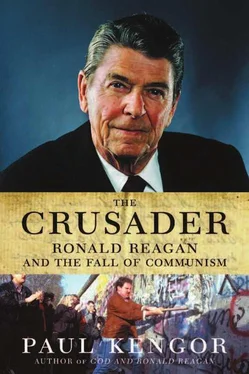18. Steve Coll, “Anatomy of a Victory: CIA’s Covert Afghan War,” Washington Post, July 19, 1992, A1.
19. Lyakhovskii’s statement, published in Russian, is cited by William E. Odom, The Collapse of the Soviet Military (New Haven and London: Yale University Press, 1998), 103.
20. The precise date is still classified. Peter Rodman says that it was signed in March 1985. Rodman, More Precious Than Peace, 337.
21. NSDD-75, January 17, 1983, 4. NSDD is on file at Reagan Library.
22. I have filed a FOIA request with the federal government to try to obtain its release.
23. Schweizer, ed., The Fall of the Berlin Wall, 19.
24. Coll, “Anatomy of a Victory,” A1.
25. Scott cites Gelb and other sources. James M. Scott, Deciding to Intervene: The Reagan Doctrine and American Foreign Policy (Durham, NC, and London: Duke University Press, 1996), 59.
26. Simpson, NSDDs, 446–47; and Jack Anderson and Dale Van Atta, “‘Perverse Opposition’ to Afghan Aid,” Washington Post, April 26, 1987.
27. Rodman, More Precious Than Peace, 337.
28. Simpson, NSDDs, 446–7; and Jack Anderson and Dale Van Atta, “‘Perverse Opposition’ to Afghan Aid,” Washington Post, April 26, 1987.
29. Rodman, More Precious Than Peace, 337; and Coll, “Anatomy of a Victory,” A1. 30. Milt Bearden, The Main Enemy, 180, 210.
31. Scott, Deciding to Intervene, 59; Schweizer, Reagan’s War, 299; and Coll, “Anatomy of a Victory,” A1.
32. Coll, “Anatomy of a Victory,” A1.
33. Quoted in Vernon Loeb, “Undercover to Hardcover; Warrior Milt Bearden Is Warming Up To a New Career,” Washington Post, December 12, 1998.
34. Coll, “Anatomy of a Victory,” A1; and Schweizer, Victory, 151–53, 242–54. 35. Ibid.
36. “Did he [Reagan] want to see the Soviets humiliated in Afghanistan?” asked Ed Meese, repeating the question that I posed to him. “Though I don’t recall hearing such words from him, he may well have said that. That would not be out of character with his goals, considering the necessity he saw in stopping and rolling back Soviet aggression.” Interview with Ed Meese, September 9, 2002.
37. Schweizer, Victory, 151–53.
38. Interview with Bill Clark, November 1, 2004.
39. Bearden, The Main Enemy, 210.
40. Schweizer, ed., Fall of the Berlin Wall, 19–21; Schweizer, Reagan’s War, 234–35; and various references in Schweizer’s Victory.
41. Interview with Ed Meese, September 9, 2002.
42. Steve Coll, “In CIA’s Covert Afghan War, Where to Draw the Line Was Key,” Washington Post, July 20, 1992, A1.
43. Coll, “In CIA’s Covert Afghan War,” A1.
44. Cannon, Role of a Lifetime, 323.
45. Coll, “Anatomy of a Victory,” A1. This is also stated by George Crile in his compelling Charlie Wilson’s War (New York: Atlantic Monthly Press, 2003), 504.
46. These figures are cited by Schweizer, Victory, 214; and Schweizer, Reagan’s War, 236.
47. Such language was omnipresent in Soviet official statements and press reports in the 1980s. Among others, see Moscow TASS statement January 2, 1984, published as “DR A Spokesman Hits ‘Adventurist’ Reagan Policy,” in FBIS, January 3, 1984, 3-JAN-84, D5; Alexander Timoshkin commentary in Arabic on Moscow radio, February 4, 1983, published as “Reagan Support for Zionists, Afghans Attacked,” in FBIS, February 10, 1983, 10-FEB-83, A1; Melor Sturua, “Aggressors and Hypocrites,” Izvestia , March 1, 1985, 5, published as “U.S. Conducting ‘Dirty War’ in Afghanistan,” FBIS, FBIS-SOV-5-MAR-85, March 5, 1985, A7–9; and TASS statement, December 29, 1985, published as “Reagan ‘Maliciously Distorted’ Soviet Afghan Policy,” in FBIS, 30-DEC-85, A6.
48. For references on Gorbachev’s insistence in ending the arms race, see: Gorbachev, Memoirs, 136, 171, 415, 445–46.
49. Arbatov speaking on Studio 9 Program, June 18, 1987, transcript published as “Studio 9 Participants Discuss Reagan’s Recent Speeches,” in FBIS, FBIS-SOV-19-JUN-87, June 19, 1987, A9.
50. Reagan, An American Life, 237–38.
51. Interview with Cap Weinberger, October 10, 2002.
52. Weinberger speaking at the conference, “Reagan’s War and the War on Terrorism,” hosted by the American Enterprise Institute, Washington, DC, November 13, 2002. We can probably predict two partisan reactions to Weinberger’s remarks: Liberals who for years disregarded or attacked nearly everything Weinberger said, may suddenly take his word (or maybe half of his words) as the final statement on this issue; they will cite his remarks as proof that Reagan never pursued a buildup to bankrupt the USSR. On the other hand, conservatives, who have long championed Weinberger as a hero, will want to ignore some of these remarks.
53. Weinberger, In the Arena, 266, 270–1, 274–78, 280–1, 285–86, 329.
54. Richard Allen interviewed on “Reagan,” The American Experience, PBS.
55. The Reagan people I spoke to confirmed this thinking. It is unnecessary to quote them all here, particularly since most of them used language almost identical to what Reagan himself said, which is quoted at length below. To cite just one example, in November 2002 Jeane Kirkpatrick said of Reagan: “He understood that the Soviet economy was in decline and would continue to decline…and that the Soviets could never win an arms race.” Source: Kirkpatrick speaking at conference, “Reagan’s War and the War on Terrorism,” hosted by the American Enterprise Institute, Washington, DC, November 13, 2002.
56. A photograph of the handwritten speech is printed in Reagan, In His Own Hand, Skinner, Anderson, and Anderson, eds., 438–42.
57. “Reagan: ‘It Isn’t Only Washington…’” National Journal, March 8, 1980, 392.
58. Reagan, “Interview with the President,” October 16, 1981.
59. Reagan, “Remarks and a Question-and-Answer Session With Reporters on the Second Anniversary of the Inauguration of the President,” January 20, 1983.
60. Reagan, “Question-and-Answer Session With High School Students on Domestic and Foreign Policy Issues,” January 21, 1983.
61. Ibid.
62. Ibid. Note Reagan’s formulation: A) America needs to join the arms race against the Soviets, B) the Soviets will try to match the arms race, C) “hope” of “disarmament” will follow, and D) “this is what we’re [Reagan administration] doing” because “we want peace.”
63. Reagan, An American Life, 267.
64. Speech by Deputy R. N. Stakheyev, published in Izvestia , November 28, 1985, 3. Published in The Current Digest of the Soviet Press, 37, no. 48 (1985): 14.
65. “Chance Missed, Search Continues,” Izvestia , October 17, 1986.
66. Boris Altshuler, a Soviet expert who for years estimated the annual portion of Soviet GDP that went to the military, claims that by 1989 that portion had risen to a staggering 73%, compared to a range of 40%–50% in the 1960s and 1970s. See Reed, At the Abyss, 213, 218–19.
67. One of the best authorities on this is Odom, The Collapse of the Soviet Military, 104, 119.
68. Statement by the Moscow World Service, February 4, 1984, published as “U.S., Soviet Defense Expenditure Contrasted,” in FBIS, FBIS-6-FEB-84, February 6, 1984, A1.
69. Gorbachev, Memoirs, 215. Don Regan said that he took a close look at the Soviet budget during one of the arms summits. He gleaned that the Soviets dedicated 50% of their budget to defense alone, and 17% of GDP. Regan, For the Record, 296.
70. Reed, At the Abyss, 213, 218–19.
71. Shevardnadze November 1991 interview with International Affairs (Moscow). Reprinted in “Retrospective on the End of the Cold War,” Woodrow Wilson School, Princeton University, February 25–27, 1993, 6.
Читать дальше












